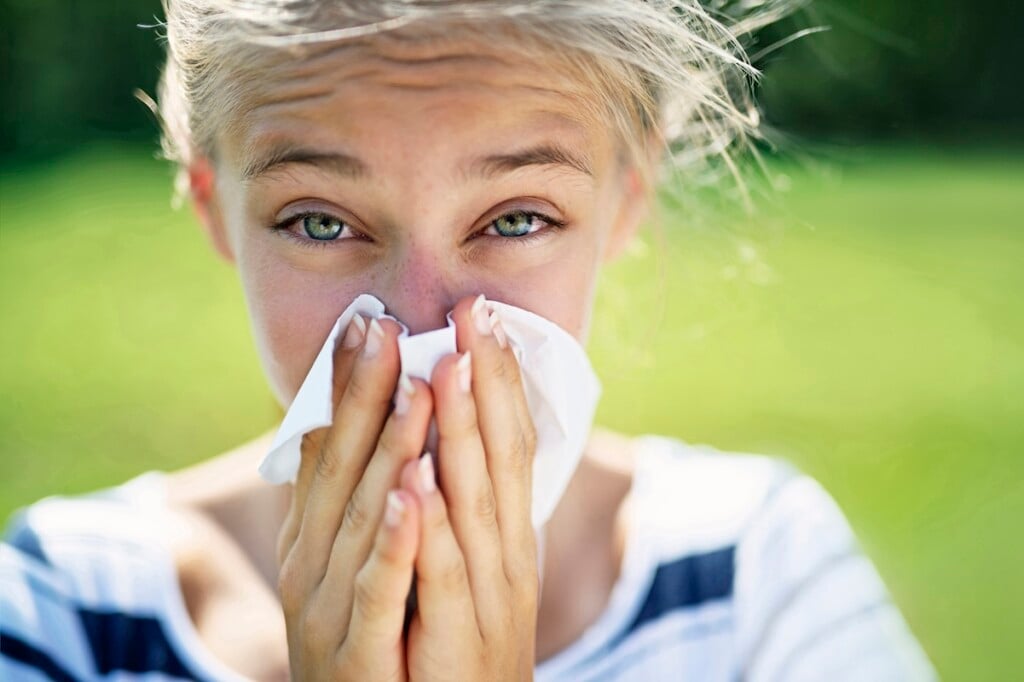Nothing To Sneeze At
When the high pollen count has you reaching for relief, here's what works—and what doesn't.

The onset of spring should be an exciting time. The days are longer, green is making a comeback and we’re all looking forward to throwing open some windows and letting the air in. But for many Americans the warming trend of these days also means that seasonal allergies are on the march. According to the Allergy and Asthma Foundation of America, as of 2021, 26 percent of adults and 19 percent of children had been diagnosed with seasonal allergies.
Coughing, sneezing, itchy and runny eyes, a tight chest, a sinus headache—these symptoms may seem mundane, but they can be debilitating when they’re chronic. “Allergy care can become confusing because there are so many over-the-counter options,” says Archana Mehta, M.D., an allergist in Parsippany-Troy Hills. “If someone is confused, or they’re taking medications and not feeling better, there are lots of solutions we can offer them.”
Salwa Elias, M.D., an allergist in Morris Plains, adds: “The effectiveness of the treatments we have available is well-documented.”
Looking for seasonal-allergy relief? MORRIS & ESSEX sat down with Dr. Elias and Dr. Mehta to discuss some facts, some common misconceptions and some advice on what works:
Can nasal irrigation help? Saline sprays or nasal irrigation can be a good immediate first step to make yourself feel better. They’re a way for you to flush out your sinuses at home, both to remove the irritating allergen and to soothe in the short term. Both doctors recommend these treatments to their patients. “Nasal irrigation should always be tried first, because it can provide fast, nonspecific relief,” says Dr. Elias. “I always recommend saline irrigations either daily or as needed, depending on the patient’s condition.”
Dr. Mehta suggests consulting a doctor before incorporating nasal irrigation into your routine, though. “If a patient has a deviated septum, or a very high level of swelling inside the nose, then saline irrigation can have adverse effects,” she explains. “It’s always good to talk to a doctor first.”
Is local honey an option? There’s some indication that eating honey, a popular at-home treatment, can introduce pollen allergens into your system and help you build up an immunity to them over time. It’s not a bad theory; Dr. Mehta says that the concept is similar to sublingual immunotherapy, which places small amounts of medication under a patient’s tongue. “It may help mild allergy symptoms, but it hasn’t been proven scientifically,” says Dr. Mehta. “However, it can’t hurt, and it’s a great way to kill a sugar craving if you have one.”
Dr. Elias echoes the sentiment, saying, “It may help the body to build a tolerance to local allergens, but is not proved to be effective in alleviating allergy symptoms and does not replace immunotherapy.”
Will increasing probiotics give relief? What about Vitamin C? Recent studies have suggested that a heathy microbiome in the intestinal tract can lower the risk of allergies in general. “There are studies being done regarding certain probiotics helping to reduce food allergies, so it’s certainly possible that they could improve seasonal allergies as well,” says Dr. Mehta, “but nothing has been proven yet. In general, they’re good for your gut health, and anything that reduces inflammation might reduce allergy symptoms as well.”
Dr. Elias offers a similar perspective on both probiotics and Vitamin C, which is a known anti-inflammatory. “Increasing probiotics and Vitamin C in the diet can help a patient’s general health, but will not necessarily make a difference in alleviating allergy symptoms.”
Can you predict the allergy season? There’s no easy way. “It’s hard to predict, honestly,” says Dr. Mehta, who explains that the allergy season is directly tied to the weather. In New Jersey, allergy season tends to be a two- or three-week period, often the last two weeks of April or the first two weeks of May, when oak, birch and maple trees open up and are pollinated. The exact time and severity depend on the weather, which is what makes it so difficult to predict precisely. A rainier spring, for instance, will make for a milder allergy season, while a dry one will be worse.
Dr. Mehta also notes that the allergy season has been getting longer and stronger as the climate warms. “Last year, I remember taking a walk in Denville and seeing birch trees being pollinated on Jan. 19,” she says. “Birch pollen is the light green pollen you see on your car in the spring. We are seeing seasons getting longer as the climate changes.”
On top of the time in the season, time of day can also make a difference in the severity of allergies, Dr. Mehta says. “Pollen counts are often highest at midday, and lowest earlier in the day, when there’s still dew on the ground. Knowing that can help people plan.”
Is there a cure for seasonal allergies? Allergies are one of the most common chronic conditions in the United States, but Dr. Elias says there is hope for those looking to ease their symptoms for good. Immunotherapy, also known as allergy shots, is very appealing to people for this reason. “Immunotherapy is the only disease-modifying treatment available for several common allergies,” she says. “It modifies the immune response a body has to an allergen.”
Dr. Mehta calls immunotherapy “the most effective way of reducing allergies,” and then explains: “The treatment has two phrases, a buildup phase and a maintenance phase. During the buildup phase, you come in for a shot once a week, and the repeated exposure desensitizes you to the allergen. Your body becomes more tolerant. During the maintenance phase, you come in once a month to ensure that you remain less reactive.”
“When the right patient goes through the treatment, it is very effective,” Dr. Mehta adds. “Many have a lot of success with it.”
There are lifestyle changes that can ease symptoms in the short term. Dr. Mehta recommends wearing sunglasses when outside to create a barrier from the pollen, taking frequent showers, keeping windows closed and using air purifiers. But in many cases, medical treatment can also bring a long-term improvement in quality of life.
“There are many treatment options available,” says Dr. Mehta. “If every spring you’re taking multiple medications and still going to urgent care for steroids because of how severe your symptoms are, there are treatments to ensure that doesn’t happen. We can spare you from that.”

